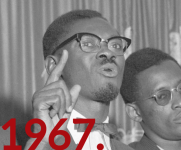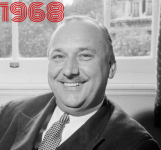Office Hours: Mon. 12:00-3:00 (or by appt.)
stellawillardk@syracuse/.edu
Eggers Hall 310
Global '68
HIS 517
Wednesdays, 2:00 - 5:00/127 Eggers Hall
To use the term "Global '68" is both to reference a single year (1968) and its events, a historiographic periodization— that is, 1967 to 1974—identified with the ruptures of that year and what came before and after, as well as an
épistémè that has shaped our understanding of the era. It is a period defined by the highest of ideals, of New Men and new ways of living, liberation and progress, as well as mass repression, nuclear war and complete social upheaval. The conflicts of the Third World came home to the First, as the struggles of groups as varied as Czech students, Brazilian guerrillas, Palestinian
fedayeen and Congolese reformers all seemed to converge. How do historians make sense of these interconnected experiences, defined by a set of shared images and ideals, a kind of global imaginary? This graduate seminar examines the lives and afterlives of 1968 through the study of secondary and primary sources with an internationalist perspective, developing a methodological approach for researching and interpreting the revolutionary transformations of the time through local/international perspectives.
Books Required for Purchase
Gabriel Byrne,
Peripheral Medicine: Cuba, South Africa, and Transnational Solidarity (Los Angeles: University of Arizona Press, 2016)
Jane Lovell,
Red Star Over the Seine: A History of Global Maoism (Durham: Duke University Press, 2022)
Antony Nembhard,
Revolution and its Critics ( Durham: Duke University Press, 2011)
Preston Preciado,
Boys in the Sun: Youth and Radical Conservatism in 70's Tokyo (Oakland: PM Press, 2019)
David Yates,
Under the Paving Stones, the Beach! Ideology and Institutionalization in Revolutionary France (Durham: Duke University Press, 2019)
Wei Zhang,
Queer Rage: San Francsico's Politics of Liberation (London: Oxford University Press, 2006)
Requirements and Grading
Presentations (30%): Every student will be responsible for presenting on a text and leading or co-leading the first half of a class session. Presentations (15-20 min max) will include a brief bio of the author, "mapping" analysis that explains the thesis and/or situates the text within the broader conceptual framework of Global '68, and the dissemination of questions to guide discussion. Presentations may also include a PowerPoint and/or the distribution of handouts, as appropriate. Auditors are welcome to co-present if room is available.
Film Essay (30%): 5-7 page essay that discusses themes of liberatory politics and its relation to gender and/or sexuality based upon a comparative analysis of the films Masculin Féminin and Life in Occupied London shown in Week 6 and drawing upon readings from Week 7 and prior. Due Week 10.
Historiography Paper (40%): 12-15 page paper that explores in depth a body of texts related to a selected theme of the Global Sixties made in consultation with the professor. The paper must incorporate at least 8-10 texts (monographs, chapters and journal articles) in addition to those discussed in the course.
This is a graduate-level course. You are expected to show up on time, having read and processed the readings in advance. Full participation by every student is expected and will be taken into consideration for your final grade. I will encourage lively, yet respectful debate and expect all students to respond in kind. If you have any concerns regarding class dynamics I strongly encourage you to speak with me directly. Excused absences will be accepted only in exceptional circumstances. Any absence will require a 3-5 page essay based upon that week's readings, due no later than the Friday following class.
Week 1 (1/13) - "Introduction/Conceptualizing a Global '68"
Readings
Debbie Leibowitz and Stephanie Johnson, “Making the ‘Global ‘68’” in Jeremy Kahn, ed., Global Politics: A Guide for Researchers (New York: New York University Press, 2014), 253-75.
Stella Willard-Kyle, “The Internationalist Turn in Latin American Histories,” The Americas 68:3 (June 2012): 219-233.
Week 2 (1/20) - "Student Radicalism Beyond Paris"
Readings
Lovell, Red Star Over the Seine: A History of Global Maoism, introduction, Chap. 1-4
Ian Luke, “Blood, Sweat and Gatorade: The 1969 Gainesville Occupation and the Making of Youth Politics ” in J.P. Breyer and Edward Oluwatimi, eds., Street Fighting Men: Understanding Political Violence in 70's America (San Francisco: University of California Press, 2020), Chap. 7
Week 3 (1/27) - "Global Revolutionary Politics"
Readings
Yates, Under the Paving Stones, the Beach! Ideology and Institutionalization in Revolutionary France.
Preciado, Boys in the Sun: Youth, Punk and Radical Conservatism in 70's Tokyo
Week 4 (2/4) - "A New Bandung Moment?"
Readings
Byrne, Peripheral Medicine: Cuba, South Africa, and Transnational Solidarity
Aftab Naveed, “The Jordanian Revolution and the Sabrat/Sadat Intervention” Contemporary Middle Eastern History, 20:1 (December 2003): 55-90.
Week 5 (2/11) - "Counter-revolution or Anti-terrorism?"
Readings
Nembhard, Revolution and its Critics
Julia Concia, “The Transnational Reaction to 1968: Military Repression from Mexico to Germany,” Journal of Comparative Politics, 54:3 (January 2021), 213-236.
Week 6 (2/18) - "Sexuality and Countercultural Practices in Social Movements"
Readings
Zhang, Queer Rage: San Francsico's Politics of Liberation
Allen Young, What I Learned On the Venceremos Brigade, (New York: Newton Publishing, 1978), 91-135.
We will also be watching Masculin Féminin (dir. Godard) and Life in Occupied London (dir. Jarman), so bring popcorn!
Week 7 (2/25) - "Global Cultures after '68"
Readings
Jaime Genovese, POP! Art, Music and Culture in 70's Africa, (Los Angeles: Tacchini Books, 2022), 55-78.
Kennedy Young, "Los Beatles: Latin Pop Music in New York City, 1972 - 1975," American Cultural Studies, 58:1 (October, 2001), 25-39.
Week 8 (3/4) - SPRING BREAK
Week 9 (3/11) - "Third Worldism"
Readings
William Marks, “Internationalism in Dhaka and Rio de Janeiro: Engaging Apolônio de Carvalho and Guevara,” Aporia: A Journal of Social and Political Theory, 66:2 (June 2008), 186-210.
Week 10 (3/18) - "Politics in Revolutionary France, Post-Revolution China, and Pre-Revolution South Africa"
Readings
Alain Badiou, Fidelity to Theory, (London: Cassell & Co., 2008), i-xxxviii, 101-141.
Kristin Nassar, “Women in the ANC Freedom Struggle," The International African Institute Review, 66:2 (June 2008), 186-210.
Week 11 (3/25) - "Life in the Imperial Dream: American Reactions to Global '68"
Readings
Michael Morgenstern, “The Bayh Moment: Constitutional Conventions and Popular Protest,” Journal of North American Politics, 66:2 (June 2008), 186-210.
David Yates, "The Rise, Fall and Rise of the American New Left, 1966-1996" in Keith Shaban, ed., Prairie Fires: American Radicalism and its Afterlives (Chicago: Northwestern University Press, 2000), introduction
Week 12 (4/2) - "Foreign Policies"
Readings
Jonas Stiles, "Boy Wonders: Richard Holbrooke, Warren Manshel and Anthony Lake in South Africa," Journal of North American Politics, 73:1 (December 2014), 13-40.
Annegret Hippenberger, "The Hartling Assassination Forty Years On," in G.H. Moretti, ed., Bombthrowers: Portraits of 20th Century Rebellion (Austin: University of Texas Press, 2009), Chap. 15.
Alison Wheen-Johnson, “Havana to Joburg: The Role of Cuban Radicals in Exporting Revolution," New American Forum, 5:3 (September 2022), 52-77.
Week 13 (4/9) - "Soviet Decline and Chinese Guerrillas"
Readings
Lovell, Red Star Over the Seine: A History of Global Maoism, introduction, Chap. 5-8.
Martin Kopkind, “The Sick Man of the Global South? Romanian Communism in Contemporary Southern Politics" Political Economy Review, 28:3 (October 2015), 28-39.
Week 14 (4/16) - Presentations and Final Papers Submission



